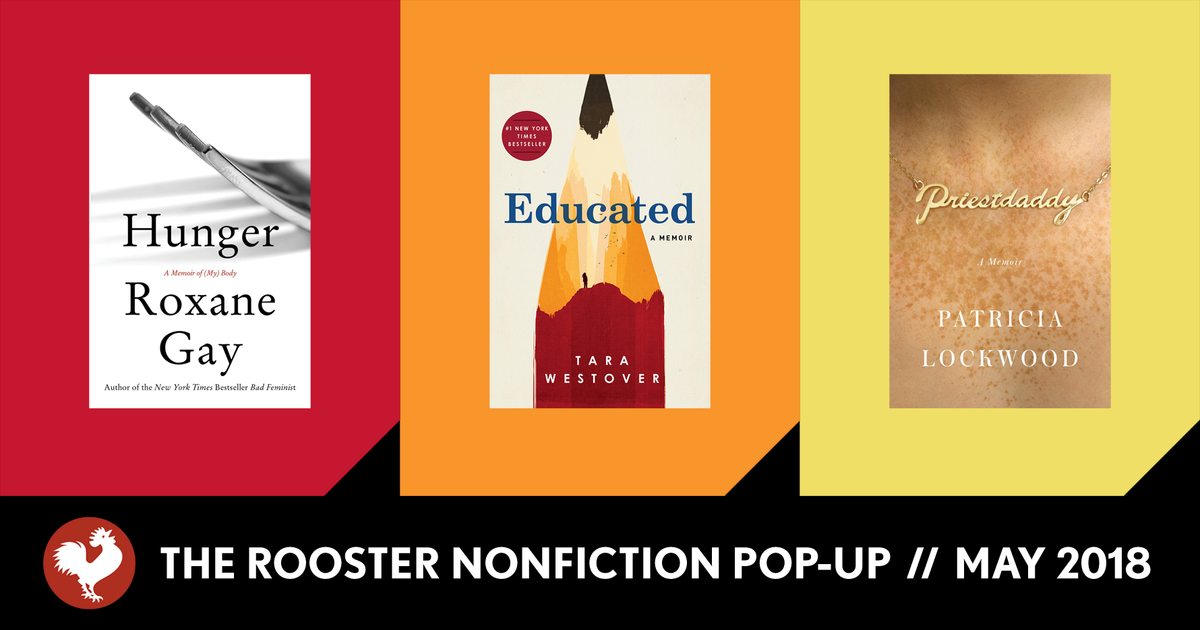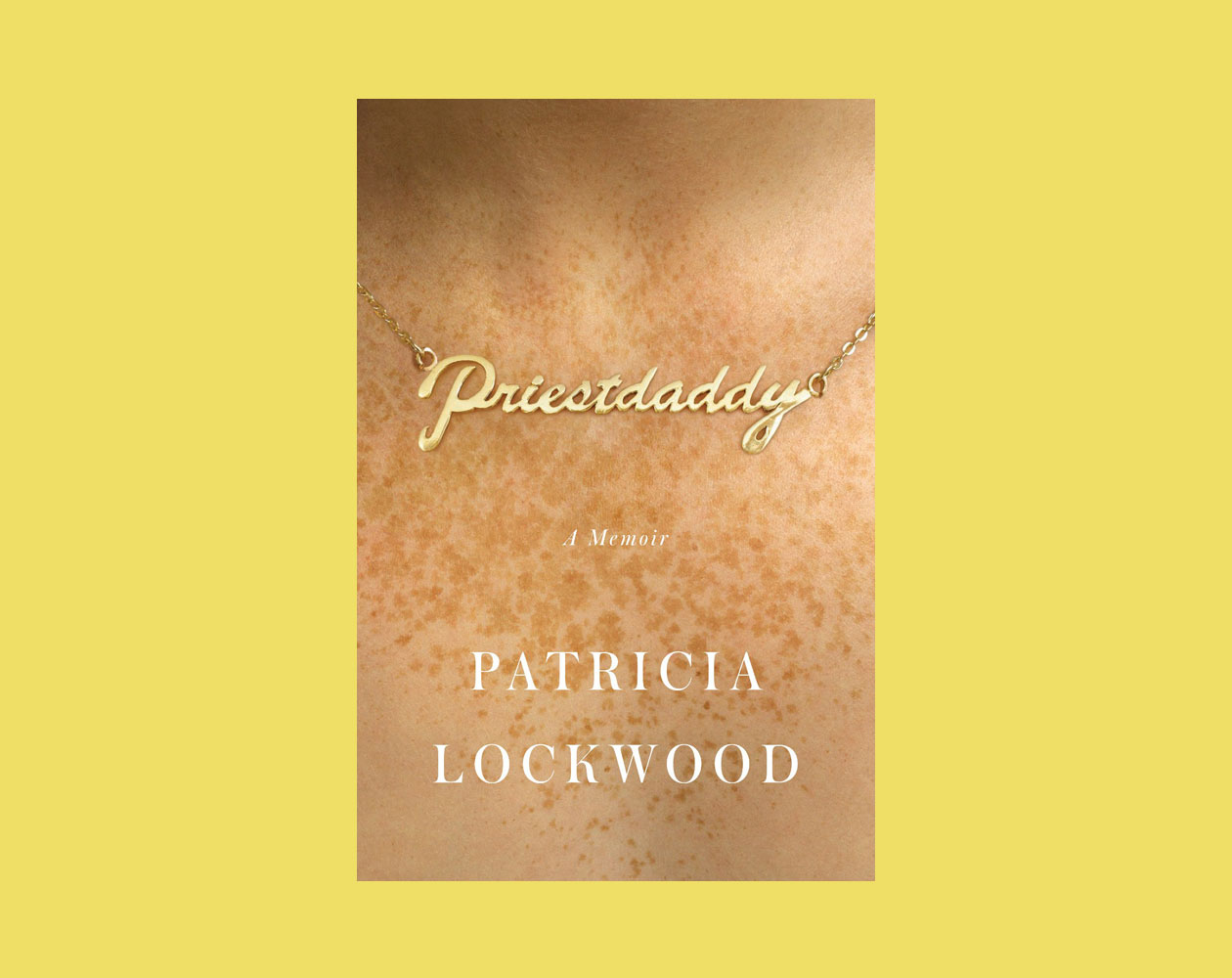The Rooster Nonfiction Pop-up: Priestdaddy, First Half
We're down to the last book in our first-ever Tournament of Books nonfiction event. Today, Sarah Hepola and Andrew Womack discuss the beginning of Patricia Lockwood's memoir, Priestdaddy.

Welcome to our first-ever Rooster Nonfiction Pop-up, brought to you by the organizers of the Tournament of Books.
All month long we’ll be discussing three recent works of nonfiction. To choose which books we’re reading this month, we asked this year’s ToB readers for suggestions back in March. We narrowed that list down to a single genre—memoir—and our readers voted to decide which three books we’d read for this event, and here they are: Hunger by Roxane Gay, Educated by Tara Westover, and Priestdaddy by Patricia Lockwood. You can see the full list of nonfiction contenders here.
Unlike the Tournament of Books and the Rooster Summer Reading Challenge, the Rooster Nonfiction Pop-up isn’t a competition—only a discussion about these three memoirs. Every Tuesday and Friday in May we’ll meet up to talk, and we’ll be teaming up with Sarah Hepola, author of the New York Times bestselling memoir Blackout: Remembering the Things I Drank to Forget. Grab some books and join in the fun!
- See the May 2018 nonfiction reading schedule
- Catch up on previous chats: Hunger (first half, second half); Educated (first half, second half)
- Jump into today’s discussion in the comments
Please note: We receive a cut from purchases made through the book links in this article.
Andrew Womack: Priestdaddy is Patricia Lockwood’s memoir about how she and her husband, facing severe financial hardship, move in with Lockwood’s mother and father—a married priest—and live in the church rectory. That is a golden setup, and this book more than delivers on the humor. I think I was laughing nearly nonstop for the first five or so chapters.
Sarah Hepola: So, I really struggled with this memoir. In the first 50 pages, it felt like every character existed on a wavelength I just couldn’t access. They said things that didn’t make sense, they did things that didn’t make sense. Her father’s conversion to Catholicism takes place while watching The Exorcist on a nuclear submarine. Lockwood gets engaged to a man she met on the internet within an hour of meeting him. “He had the small, neat, unjudgmental ears of a teddy bear,” she explains. I just felt pelted with kookiness.
Flipping through my copy, I can see all the places in the margins where I wrote “funny.” Lockwood is undoubtedly a clever writer. But while you were laughing nonstop at the first five chapters, I was experiencing that seizing feeling in my chest like I wasn’t sure I was going to make it. A lot of my reaction can be boiled down to my feelings about her father, which we’ll talk about later, and my own troubled history of using comedy as a shield.
One of the great joys of staying with this book, for me, was getting past that zaniness and into depths that were much richer. I do think her world presents as an alternate reality because it was one. She had a really unusual life. As she writes at one point, “My childhood sky was green.”
Sarah Hepola is the author of the bestselling memoir, Blackout: Remembering the Things I Drank to Forget. Her writing has appeared in the New York Times, The Guardian, Elle, Glamour, BuzzFeed, Jezebel, and Salon, where she was an editor. She has been a contributor to The Morning News for more than a decade. She lives in Dallas, and she is currently working on a second book. Please don’t ask her about it.
Andrew Womack is a founding editor of The Morning News.
Andrew: I know what you mean. While the beginning chapters are certainly zany—and I did like them, a lot—after that, her range just explodes.
Sarah: She has a sneaky way of sliding from humor to sincerity to darkness. Some of my favorite early passages were about her experience with the early internet—a softer, gentler time. She talks about feeling hidden at the same time she feels revealed, and the adrenaline rush of a fevered email romance. “As if the ghost of a passenger pigeon had flown into your home and delivered it directly into your head, so swooping and unexpected and feathered was the feeling.”
One of the interesting through-lines in this book is how the internet functions for her in a way that the church functioned for her father. It nurtures, supports, offers a place for her confessions. When her husband needs cataract surgery, their online friends “pass the basket” to pay, a reminder that a lot of what we’re looking for—either in laptops or pews—is a sense of community.
By the way, I appreciated how this memoir showed the financial realities of a writing life. Lockwood’s husband is a journalist, dealing with a cratering industry, and she’s a poet, and there’s a lot to be said for doing what you love, but you trade a few financial safety nets in that bargain, and not all of us can afford Brooklyn or California. Sometimes—if you’re lucky!—you end up at Mom and Dad’s.

“In Priestdaddy, Lockwood interweaves emblematic moments from her childhood and adolescence—from an ill-fated family hunting trip and an abortion clinic sit-in where her father was arrested to her involvement in a cultlike Catholic youth group—with scenes that chronicle the eight-month adventure she and her husband had in her parents’ household after a decade of living on their own… Priestdaddy is an entertaining, unforgettable portrait of a deeply odd religious upbringing, and how one balances a hard-won identity with the weight of family and tradition.” (Amazon / IndieBound / Powell’s)
Book description excerpted from publisher’s summary and edited for length.
Andrew: That part about her husband’s eye surgery also brought out the character of her mother, who is amazing. That line when she phones Lockwood and says, “It’s your mother. Who gave birth to you without anesthesia.” So good. In contrast to the father, who is unpredictable, her mother is the rock that gives the narrative some grounding. As Lockwood writes, “Again and again, my mother proved herself to be the person you wanted with you in a crisis. She was someone who willingly went down into the underworld and came up again as pure levity.” I would definitely want her on my side during a crisis. I think.
Sarah: I loved her mom. There’s a chapter called “The Cum Queens of Hyatt Place,” where the two of them spend a night in a motel that appears to have a cum stain on the blanket, and they end up lying on the bed cracking each other up with cum puns, and it’s just so strange and adorable.
Her father was harder for me. I could not get my head around that character. His motivations, why he was drawn to the church, why he was allowed to stay. Eccentric people are tricky, because it’s like: Are you a good kind of crazy, or a bad kind of crazy? I was torn on this guy. I wish I’d seen her father with his congregation, or gotten more of a sense of him as a priest. Instead we experience him at home: shredding his guitar, watching conservative television, loafing around in his underwear. He’s definitely a memorable character, I’ll give him that. My problem was that I found him unsympathetic or unknowable. Why is he like this? Is he just an asshole? I also sensed these darker undercurrents coursing through the father-daughter relationship, but the tone remained so jaunty.
Andrew: Lockwood is a poet, and this is what everyone says about poets who write prose, that you can sense it, but it bears repeating because this is such extraordinary prose. As I now do, I listened to the audiobook, narrated by Lockwood, and to hear that prose with the rhythm of poetry made it even more clear.
Sarah: Yes, although I think that poetic language was another stumbling block for me in the beginning. It’s like I had to fine-tune my ear to her frequency. There is a passage where she describes her unique relationship with language:
When I read, my head seemed to go diagonal, and I swore I saw things in the sentences—not what I was supposed to see. When I read the words “moonlit swim,” I saw the moonlight slicked all over the bare skin. The word “sunshine” had a washed out look, with the sweep of a rag in the middle of it. The word “violinist” was a fig cut in half… It was as if I could read the surfaces of words, and their real hearts, but not their information.
That was fascinating to me. It’s like she’s describing a kind of synesthesia, where words have their own secret lives. I’m not a poet, clearly, but I love to see what a writer can do with words. By the end of the book—we’ll talk more about this next time—she had really persuaded me. Total convert.
Andrew: My first exposure to Lockwood was when she published “Rape Joke” at The Awl. It’s such an wonderful, cutting poem that I was happy to get a view here of what the process of writing it was like, and the opportunities that opened after the piece came out.
Sarah: It’s a great poem, another illustration of that tonal mix where mundane comic details bump up against high emotional stakes. But I found the way the poem was discussed in the book rather head-scratching. We see her writing the poem, and we learn in passing that the poem talks about a rape she experienced, and then we see the viral success of the poem and how it boosts her career, but if you haven’t read that poem—and I’m guessing plenty of readers have not—wouldn’t you be thinking: What rape?! It’s an interesting editorial decision, to allude to such an emotionally devastating event, but never tell us what happened.
Lockwood is not a linear writer. She’s not a linear thinker. That’s part of what makes her so special; she has her own skewed worldview, her own elliptical way of storytelling that is more like a series of circles than a straight line. In religion, people can get into trouble by being too literal, they can miss the larger meaning by focusing on details, and maybe I made a similar mistake in the first half of this book. I expected a kind of narrative Lockwood simply doesn’t do, and maybe I missed what she can do. I know that I enjoyed the second half of the book much more. I was finally able to “live in the mystery,” so to speak.

